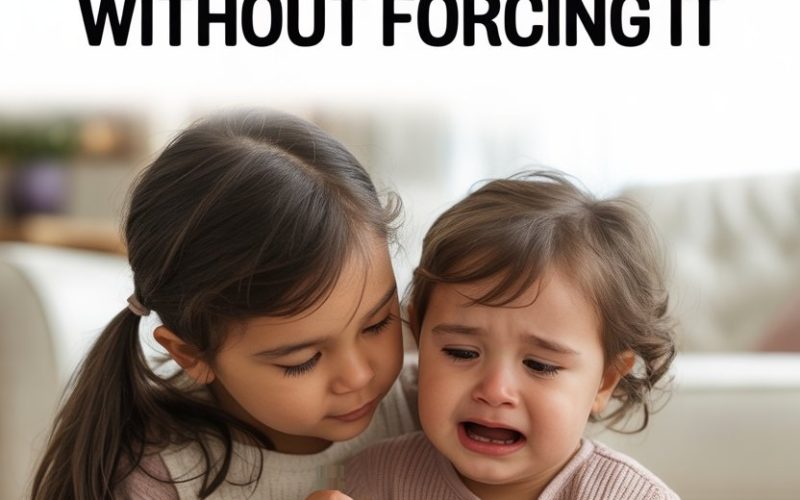Empathy is one of those parenting buzzwords that makes us all nod sagely and secretly wonder if our children will end up comforting a weeping friend or just poking them with a stick to see if they’ll cry harder.
We want our kids to be kind, but no one wants to raise an automaton who mouths “I’m sorry” with all the sincerity of a supermarket checkout robot.
But yes, empathy matters—a lot. And, good news, you don’t have to lecture your little darlings into caring about others.
Here’s how to grow proper compassion in your own home, no heavy-handed tactics required.
Model the Behavior You Want
Before launching any grand plans, glance in the mirror (not to check for Weetabix in your hair, though honestly, good on you for even getting dressed today). Empathy starts with you.
Children are hardwired to mimic what they see.
If you treat others—be it the barista, your partner, or even the person who just cut you off in traffic—with patience and understanding, your child is watching and learning.
Even when you mutter under your breath about your boss, those little ears are tuned in.
A study by Harvard’s Making Caring Common project found that children are far more likely to display empathy if they see their parents acting with compassion, rather than constantly telling them to be nice (source).
No pressure.
Ask Thoughtful Questions at the Dinner Table
The dinner table isn’t just for negotiating which vegetables must be eaten to secure pudding. It’s the social hub of the family, a place for daily download.
Try swapping out the tired “How was your day?” for questions like, “Did anyone at school have a rough day?” or “Was there a time you helped someone today?” Even “How do you think your friend felt when that happened?” can prime the empathy pump.
Don’t turn it into an interrogation, though. If your child clams up, try again another night. Sometimes they just want to talk about dinosaurs.
Use Stories, Books, and Films
Stories are empathy’s secret weapon. Whether you’re reading a bedtime story or watching a film together, stories give children a front-row seat to other people’s feelings.
Choose books or shows that feature characters experiencing real emotions and challenges. Pause and ask, “How do you think she feels right now?” or “What would you do if you were him?”
This isn’t about getting the “right” answer; it’s about sparking their imagination and helping them put themselves in someone else’s shoes (sandals, flippers, or whatever Moana is wearing these days).
If you’re after some inspiration, the EmpathyLab UK has a brilliant list of children’s books designed to boost empathy (source), and Common Sense Media reviews TV programmes through an empathy lens (source).
Talk About Your Own Feelings—The Good, the Bad, and the Ugly
Kids don’t learn empathy from a curriculum; they learn from real moments.
Share your own emotions when appropriate. “I felt a bit lonely today when my friend cancelled our coffee catch-up,” or “I got frustrated at work, but my colleague cheered me up by listening.”
Don’t overshare, please. Your child doesn’t need a blow-by-blow of your annual review.
But letting them see your humanity models that it’s okay to have feelings and to talk about them. It also shows how you manage those feelings and connect with others who support you.
Name and Validate Their Feelings
You know that look your child gets when their tower of blocks collapses or when you say “no” to a biscuit before tea? Name the feeling: “You look disappointed,” or “It seems like you’re really frustrated.”
Validating feelings doesn’t mean you have to agree with the cause (“I understand you’re upset, but we can’t have biscuits for breakfast.”). It just shows you recognize their emotional state.
Regularly naming emotions builds the vocabulary and self-awareness needed to empathize with others. Kids who know what sadness, anger, or joy feels like in themselves are far better at spotting those feelings in others.
Don’t Rush to Rescue Every Time
Every parent wants to sweep in and fix life’s little disasters. The urge to smooth out every bump is strong (and sometimes, let’s be honest, it’s just easier).
But constantly rescuing your child denies them a chance to process tough emotions—yours and theirs.
If your child feels left out at playgroup or comes home teary-eyed because their friend said something mean, resist bolting in with a solution.
Instead, ask, “How do you feel about that?” and “What do you think you could do next time?” This encourages emotional resilience and understanding.
A little discomfort is okay. Empathy grows in those awkward, tricky moments.
Encourage Perspective-Taking Through Play
Playtime isn’t just for burning off sugar-fuelled energy. It’s a golden opportunity for learning empathy—often when your child doesn’t even realise it.
When your child is knee-deep in teddy bear drama, join in. Give voices to the toys. “Oh no, Bear is sad because Bunny took her snack!”
Encourage your child to respond to the toy’s feelings. This kind of imaginative play is empathy training in disguise.
Board games can also help here, especially those that require cooperation or reading other players’ emotions.
Games like The Feelings Game or Guess Who? get kids talking about how characters might feel—bonus points if you can keep a straight face as Dad’s ‘sad crocodile’ voice comes out.
Show Empathy to Your Child When They Mess Up
Next time your child draws a mural on the living room wall or “accidentally” feeds the dog your new trainers, try empathy before launching into a lecture. “It looks like you were having fun, but I can see you’re worried I’m upset now.”
Kids who are met with understanding when they make mistakes learn that empathy is a two-way street. It helps them feel secure enough to open up about their own feelings—and more likely to consider yours.
That doesn’t mean there aren’t consequences. You’re still allowed to mourn your trainers.
Highlight Acts of Empathy When You See Them
Caught your child sharing their chips at the playground? Did they hug a sibling after an epic squabble? Shine a spotlight on those moments. “I noticed you gave your friend your favourite toy because he was sad. That was very kind.”
Positive reinforcement helps lock in those caring behaviours without sounding preachy.
Avoid making every act of kindness transactional—no need to hand out stickers for every hug or “well done.” A simple acknowledgment goes a long way.
Practice Apologising—and Mean It
Apologies aren’t just for grown-ups clutching cold coffee at 8am. Children can learn the art of a real apology, not just the mumbled “sorry” barked over a shoulder.
If you mess up (and you will, because that’s parenting), say it: “I’m sorry I snapped earlier. I was frustrated, but I shouldn’t have raised my voice.”
Help your child apologise in the same way. Talk through what they did, how it might have made someone feel, and what they wish they’d done differently.
Real apologies build connection and empathy.
Watch Out for Overkill
Empathy is a marathon, not a sprint. Some children are naturally sensitive and can become overwhelmed by the emotions of others. The goal isn’t to turn your child into an emotional sponge.
If your child seems anxious or starts worrying excessively about others, help them set gentle boundaries.
Remind them it’s okay to care while looking after themselves, too. Being “too” empathetic can be just as tough as being indifferent.
Empathy Isn’t a One-and-Done Lesson
If only there were a magic formula: one heartfelt chat, and your child becomes a mini Dalai Lama. Alas, empathy develops over years, through thousands of conversations, mishaps, giggles, and even a few door-slamming tantrums.
Some days you’ll feel like your child is the next Mother Teresa. Then there’ll be days when they refuse to share their last chip with you and laugh while you beg. That’s normal.
Stick with it. Empathy is one of those things that grows, shifts, and surprises you—often when you least expect it.
Raising Humans Who Actually Care
Teaching empathy to kids isn’t about scripts or tick-lists. It’s about showing up, being honest about feelings (yours and theirs), and coaxing them—gently—into considering the world beyond their own nose.
Some days, that’ll look like a hug for a friend. Others, it might just be a grudging apology and a sullen stomp up the stairs.
Keep modeling, talking, sharing stories, and yes, forgiving the odd “artwork” on your walls.
Compassionate kids aren’t born—they’re built, brick by wobbly brick. And you’re the foreman on duty, whether you asked for the job or not.





